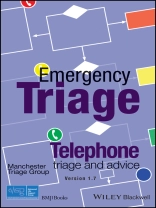Emergency Triage: Telephone Triage and Advice complements the highly successful Emergency Triage. The algorithms are rooted in the Manchester Triage System (MTS), which is used in hospitals around the world and which is acknowledged as an effective means of clinical prioritisation.
This telephone iteration of a triage system which prioritises millions of patients each year provides a robust, safe, evidence-based system for managing the clinical risk in patients who are at a distance from health care providers. The basic principles that drive the MTS remain, but this book addresses the specific difficulties of assessment by telephone. The possible triage outcomes are ‘face-to-face now’, ‘face-to-face soon’ and ‘face-to-face later’ together with a self-care option. Information and advice is suggested at every level. The advice ranges from life-saving interventions, which can be carried out until health care arrives, to self-care instructions.
Emergency Triage: Telephone Triage and Advice provides all the necessary information that telephone triage staff must have to hand as well as including examples of questions to be asked. It will be a valuable resource for staff working in emergency departments, health centres and telephone triage organisations. Furthermore hospitals that are already using Emergency Triage will benefit from being linked with a telephone triage system that follows the same protocols.
Updated to Version 1.7 in 2023.
Daftar Isi
Editors vi
Acknowledgements vii
Members of the Original Manchester Triage Group viii
International Reference Group ix
Preface xi
1 Introduction 1
2 The decision making process and Telephone Triage 7
3 The Telephone Triage method 13
4 The presentation priority matrix 25
5 Ensuring safety in Telephone Triage 29
Presentational Flow Chart Index 33
Discriminator and question dictionary 140
Index 157
Tentang Penulis
The Advanced Life Support Group (ALSG), Manchester UK, began life in 1990 and became a registered medical education charity in 1993. The organisation exists to ‘preserve life by providing training and education to the general public and in particular but not exclusively to doctors, nurses and other members of the medical profession, in life saving techniques’.
The book is written and edited by Emergency Medicine specialists who are Advanced Life Support Group (ALSG) trainers.
Janet Marsden, Postgraduate Programme Director, Faculty of Health, Social Care and Education, Manchester Metropolitan University, Manchester, UK.
Jill Windle, Senior Research Officer, Department of Emergency Medicine, Hope Hospital, Salford, UK.
Kevin Mackway-Jones, Professor of Emergency Medicine, Manchester Royal Infirmary, Manchester, UK.












